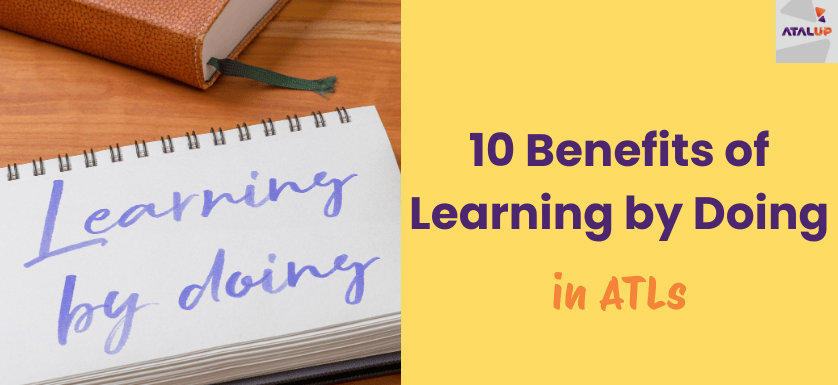
Atal Tinkering Labs (ATLs) are not just rooms filled with tools and tech, they are spaces where students do more than they read. In these labs, learning by doing becomes a way of life. With real hands-on experiences, children explore science, engineering, and innovation in the most practical way possible. This approach is not only engaging but also helps students retain knowledge better. In this blog, we’ll explore what practical learning means, its unique benefits, and how it can help improve kids’ focus in the long run.
10 Unique Benefits of Learning by Doing
1. Better Retention of Concepts
When students engage in practical learning, they don’t just memorize, they internalize. Building a simple electric circuit or designing a 3D model allows them to understand scientific principles firsthand. This form of learning by doing strengthens memory retention, especially for visual and kinesthetic learners who learn best through movement and experimentation.
2. Boosts Creativity and Problem Solving
Learning by doing triggers creativity. Instead of just reading about renewable energy, imagine a student designing a mini solar-powered fan. This practical learning method pushes them to think critically, analyze problems, and come up with unique solutions. It improves their confidence in approaching real-world problems.
3. Encourages Active Participation
Unlike traditional lectures, where students may tune out, practical learning keeps them involved. Activities like building Arduino-based sensors or participating in group robotics projects encourage kids to stay alert and contribute. This active participation is a big step toward understanding how to improve kids’ focus naturally.
4. Improves Attention Span
Fidgety behavior often comes from disinterest. But when students are engaged in something they can touch, build, or code, they focus better. Practical learning in ATL sessions, like drone-making workshops or tinkering with mechanical kits, naturally extends their attention span over time.
5. Teaches Teamwork and Collaboration
Learning by doing isn’t always solo. Working on group projects builds social skills. When students work together on a water purification model or a smart irrigation system, they learn to communicate, divide tasks, and solve conflicts. These real-life team experiences prepare them for future workspaces.
6. Develops Motor and Cognitive Skills
Especially for younger kids, using tools and handling components improves their motor coordination. Whether it’s fixing a wheel on a model car or wiring a small circuit, these tasks develop both physical dexterity and mental sharpness, key ingredients in improving kids’ focus and attention to detail.
7. Encourages Risk-Taking and Experimentation
In traditional learning, mistakes are often penalized. But in hands-on learning, mistakes are just part of the process. A failed science experiment teaches more than a perfect score on a test. This mindset encourages kids to take calculated risks, test ideas, and bounce back from failure.
8. Connects Theory with Reality
Ever wondered how to make kids see the point of textbook concepts? The answer lies in practical learning. A lesson on hydraulics becomes meaningful when students build a hydraulic crane themselves. Learning by doing bridges the gap between theory and real-world applications.
9. Increases Self-Discipline and Ownership
When students are given responsibility, say, managing the ATL inventory or leading a mini project, they feel a sense of ownership. This responsibility improves their discipline and drives them to stay focused, organized, and productive throughout the project timeline.
10. Makes Learning Fun and Relatable
Above all, learning by doing brings joy. Students don’t dread lessons when they’re busy creating, tinkering, and innovating. Whether it’s making eco-friendly products or programming a robot, fun and learning go hand-in-hand. And when learning is fun, focus improves effortlessly.
How ATALUP Helps Schools Bring Learning by Doing to Life
Setting up an Atal Tinkering Lab can be overwhelming. From applying for the ₹20 lakh ATL grant to ensuring smooth daily operations, schools need structured support. That’s where ATALUP steps in.
ATALUP is more than just a platform, it’s a complete Atal Tinkering Lab lifecycle partner. We guide schools through the entire process:
- Helping schools apply for the ₹20 lakh AIM grant
- Ensuring proper lab setup and equipment installation
- Aligning a structured curriculum for practical learning
- Automating ATL scheduling, assessments, and student tracking
- Offering teacher training and continuous mentorship support
With ATALUP, schools can seamlessly implement hands-on learning in classrooms and boost student engagement, innovation, and focus.
Want to start Learning by Doing?
Bring ATL to your school
Final Thoughts:
Learning by doing is not a trend, it’s a necessity. In a world that values innovation, critical thinking, and collaboration, practical learning equips students with more than academic knowledge. It builds life skills, improves focus, and prepares them for the future. And with platforms like ATALUP, schools can truly unlock the power of hands-on education.